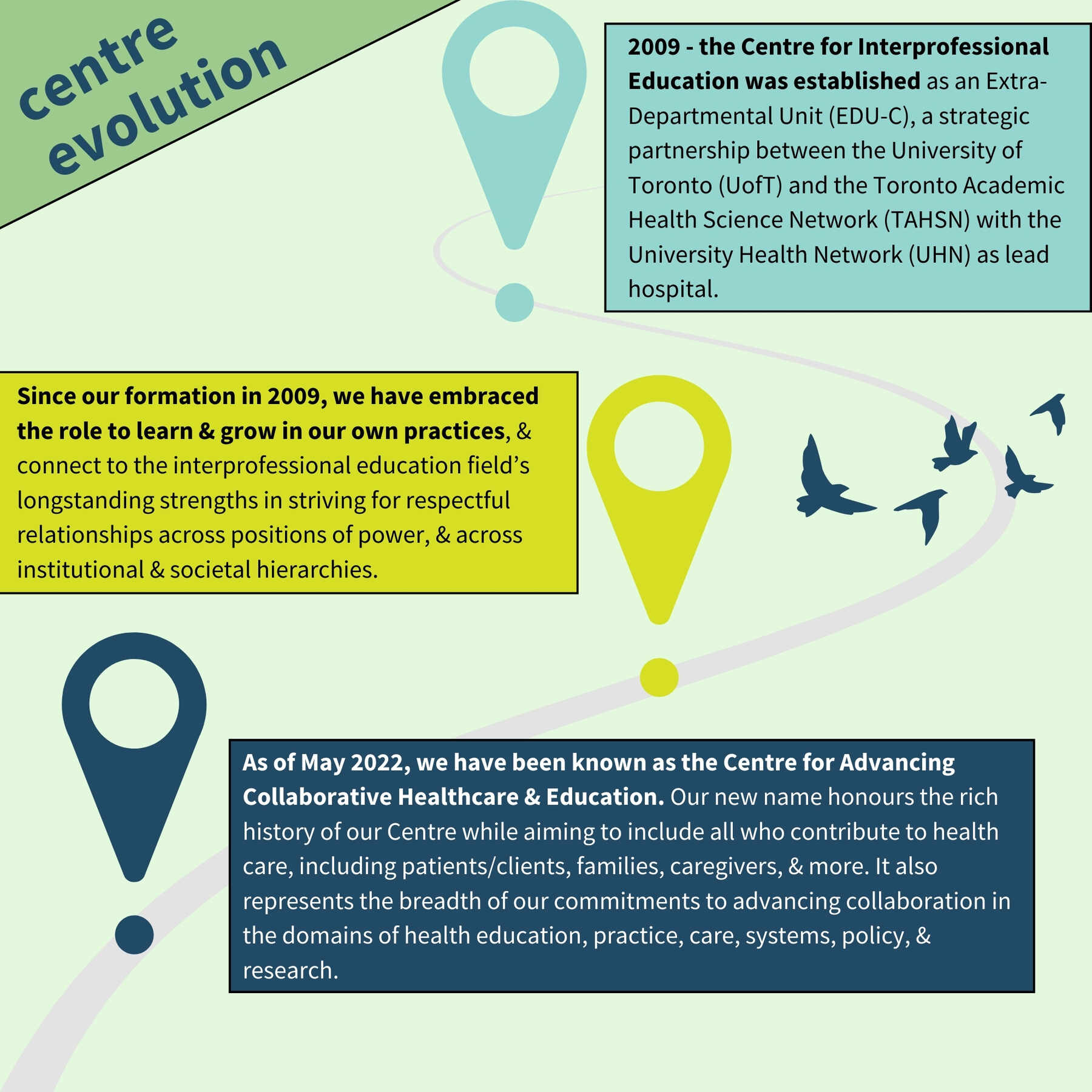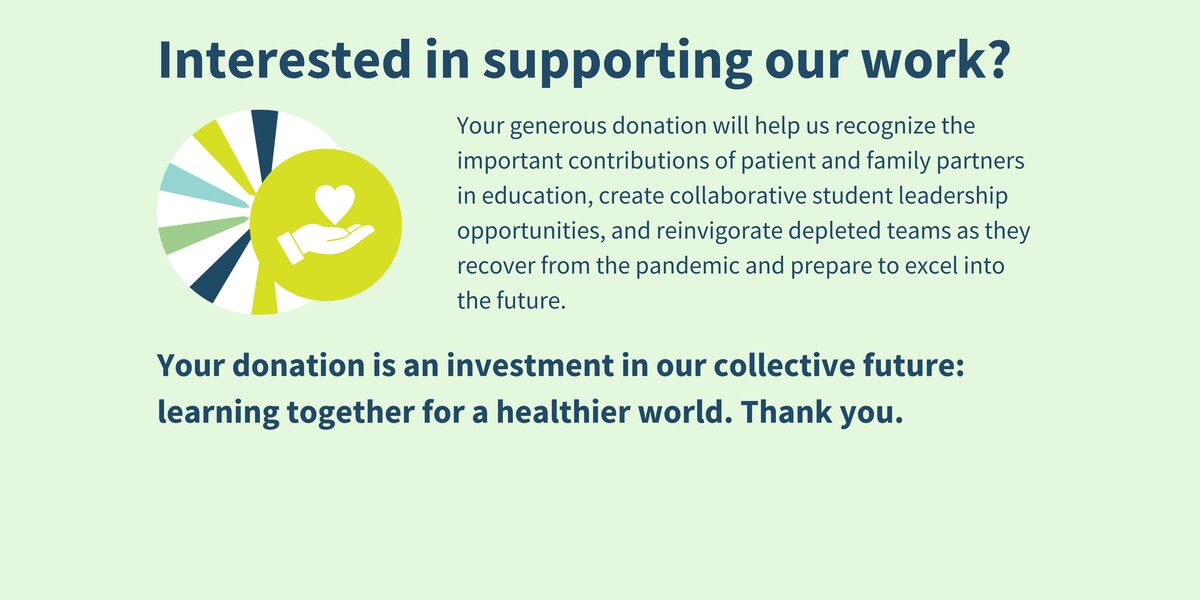
Main Second Level Navigation
Breadcrumbs
- Home
- About Us
- About Us
About Us
History
In the mid-1990s, the University of Toronto (UofT) Council of Health Sciences Deans recognized that while there were a small, but growing number of IPE opportunities being provided for students across some programs, practice-based experiences were largely missing. The Council, imagining IPE to be more than a classroom exercise, made the decision to hire four interprofessional practice coordinators within each of the medical academies to develop team-based experiences during students’ placements/rotations and to work with and across the different programs to identify priority curriculum and timetable opportunities. This was an experiment in seeing what could be done to bridge the Health Sciences Faculties and the Toronto Academic Health Sciences Network (TAHSN) of teaching hospitals. In 2003, UofT made an important next step in IPE by offering students in several faculties a mandatory one-week pain curriculum. Within TAHSN, the Toronto Rehabilitation Institute (Toronto Rehab) was pioneering the first structured IPE placements in 2004.
The establishment of the Office of IPE in 2006 with Ivy Oandasan as Director was an important milestone to advance IPE at the University. Between 2006 and 2009, the Office played a lead role, attracting over $10 million in grants from national and provincial incentive funding by leveraging faculty and health professionals across the university and teaching hospitals. To build capacity for IPE teaching and facilitation in both education and practice, ehpic™ (Educating Health Professionals for Interprofessional Care), a five-day foundations faculty development program was piloted.
The first Interfaculty Curriculum Committee (IFCC) was struck in 2007 to bring together decanal representatives to provide oversight for the development and implementation of an IPE Curriculum. Two significant milestones were reached in 2008: the completion of the UofT Core Competency Framework that would underpin the IPE Curriculum, and the Council’s endorsement of a requisite IPE curriculum, to be built on existing exemplars and implemented in fall 2009.
In 2009, the Centre for Interprofessional Education was established as an Extra-Departmental Unit (EDU-C), a strategic partnership between the University of Toronto (UofT) and the Toronto Academic Health Science Network (TAHSN) with the University Health Network (UHN) as lead hospital, with Maria Tassone as Director. Since its inauguration, the Centre has designed and delivered high-quality education activities across health education and health and social care systems. The Centre is a global leader and innovator in IPE across the continuum of learning. Learners range from over 4,200 pre-entry-to-practice students annually in academic programs, to clinicians, educators, and leaders in workplace environments, including over 3,800 alumni from our professional/faculty development programs. In more recent years, the Centre has fortified its research and innovation infrastructure, and is now poised to synergistically lead the way in advancing collaborative healthcare and education for a healthier world.
Evolution

Our Centre’s community holds a key to addressing some of healthcare’s most pressing concerns. The pandemic has highlighted the impact of health human resource shortages, the role of adaptive and team models of care, and the importance of collaborative relationships within the very fabric of society. Building and maintaining trusting relationships and continually improving our collaborative abilities is more important now than ever.
The Centre and its broader community value both science and experience on how to listen deeply and engage in dialogue, prioritizing compassion, relationships, and respect. In a time when truth and reconciliation, inclusion, diversity, equity, and accessibility have, at long last, become more formal and prominent foci for organizations, collaborative and interprofessional approaches have a dual role. We have a role to learn and grow in our own practices and we have a role to connect to the interprofessional education field’s longstanding strengths in striving for respectful relationships across positions of power, and across institutional and societal hierarchies. We will continue to lead toward collaborative change and inclusive health policies, systems, technologies, education philosophies, and practices.
Renewal
Building on our past and leading into the future, our collective commitment is unwavering. As of May 2022, we will be known as the
Centre for Advancing Collaborative Healthcare & Education (CACHE)
Learning together for a healthier world
Our new name honours the rich history of our Centre while aiming to include all who contribute to health care, including patients/clients, families, caregivers, and more. It also represents the breadth of our commitments to advancing collaboration in the domains of health education, practice, care, systems, policy, and research. And we aim to keep collaboratively leading the way toward a healthier world, together with our local to international partners.
Our new logo represents our openness to continued growth and evolution, and our intent to welcome a diversity of voices in dialogue toward building a healthier world. As a Centre we balance an openness and warmth that invites experience and story with a commitment to scientific rigour and evidence-based approaches to education, policy, and practice. Our logo and imagery aims to represent our aspirations of being increasingly inclusive, integrative, and inspiring.

Interested in supporting our work? You can donate here.
In health care, collaboration makes a world of difference. New discoveries, high-quality care, and compassionate experiences rely on strong collaboration, teamwork, and system integration. Teams must include: patient and family voices, students as leaders, and thriving health care providers and staff. Healthy teams are built through effective education and bolstered by well-designed systems. Our Centre is transforming care through collaboration across 11 health sciences programs, 15 hospitals, and a world of education, care, and research partners.
Your generous donation will help us recognize the important contributions of patient and family partners in education, create collaborative student leadership opportunities, and reinvigorate depleted teams as they recover from the pandemic and prepare to excel into the future.
Your donation is an investment in our collective future: learning together for a healthier world. Thank you.